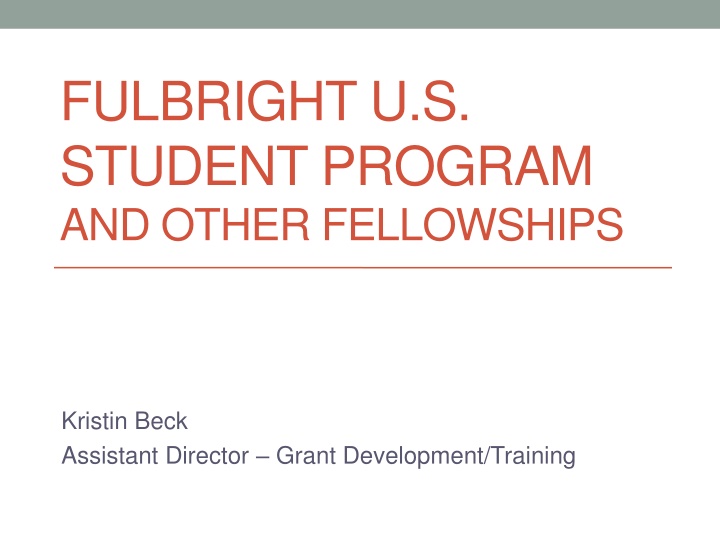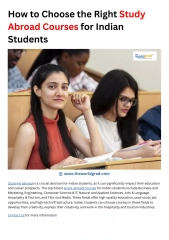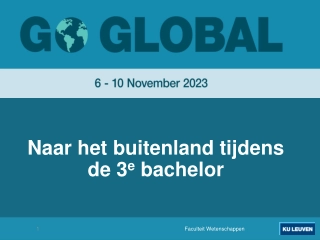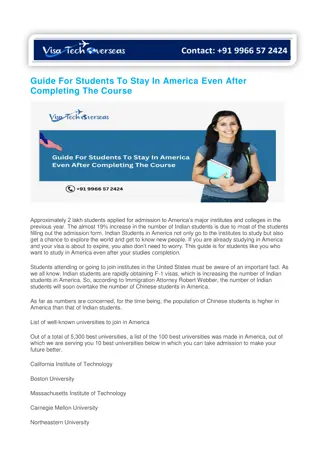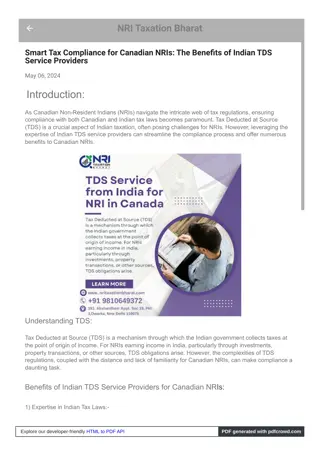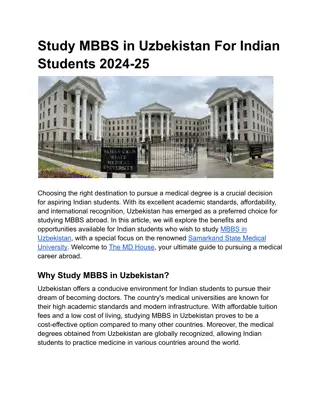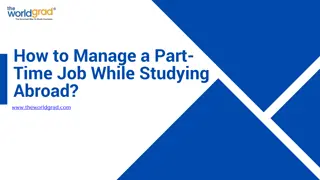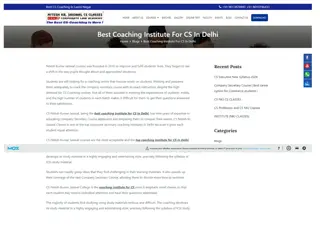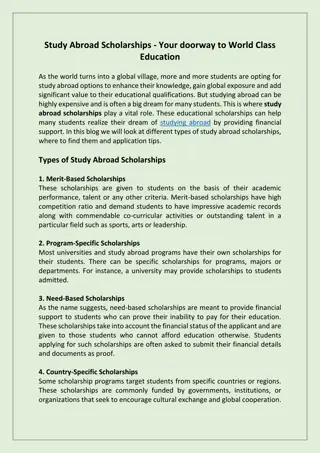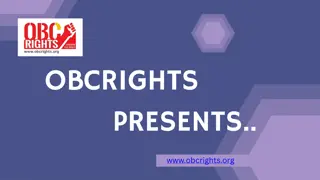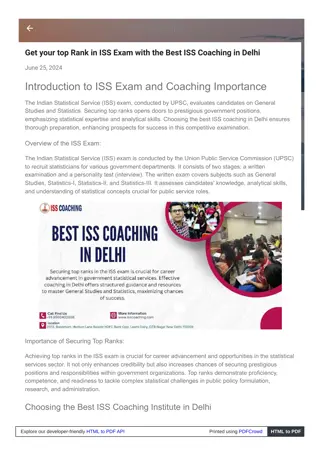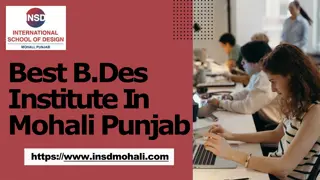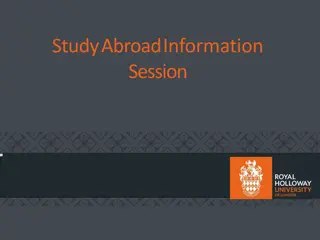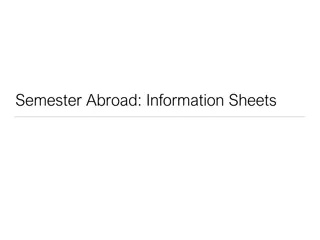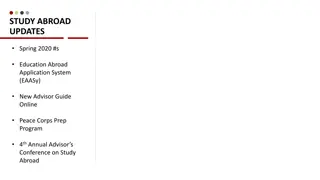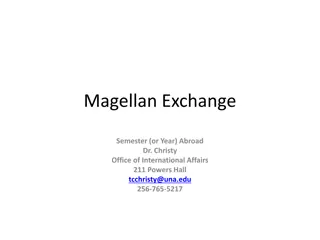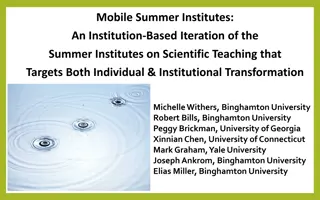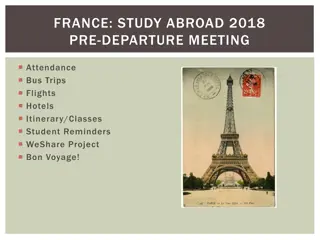Fulbright UK Summer Institutes - Study Abroad Opportunities for US Students
Explore the Fulbright UK Summer Institutes offering US undergraduate students a chance to study alongside professionals, experience UK culture, and earn credits. Learn about eligibility, application timeline, and award details. Fulbright seeks applicants with leadership qualities, academic ability, and an interest in UK culture. Apply to become a Fulbright ambassador and broaden your horizons. Visit http://www.fulbright.org.uk/ for more information.
Download Presentation

Please find below an Image/Link to download the presentation.
The content on the website is provided AS IS for your information and personal use only. It may not be sold, licensed, or shared on other websites without obtaining consent from the author.If you encounter any issues during the download, it is possible that the publisher has removed the file from their server.
You are allowed to download the files provided on this website for personal or commercial use, subject to the condition that they are used lawfully. All files are the property of their respective owners.
The content on the website is provided AS IS for your information and personal use only. It may not be sold, licensed, or shared on other websites without obtaining consent from the author.
E N D
Presentation Transcript
FULBRIGHT U.S. STUDENT PROGRAM AND OTHER FELLOWSHIPS Kristin Beck Assistant Director Grant Development/Training
Overview Fulbright Programs Fulbright UK Summer Institute Fulbright Student Program Talk with NMU Awardee National Science Foundation Research Experience for Undergraduates (REU) Other Fellowship Programs Mickey Leland Energy Fellowship Program
Various Fulbright Student Programs Fulbright UK Summer Institutes Fulbright Student Program
Fulbright UK Summer Institutes 3 or 4 week program for US Undergraduate Students Depending on the Institute, students will have the opportunity to: Study alongside leading academics and professionals Develop knowledge in specific fields Experience cultural and social events Visit UK cultural sites and areas of scenic beauty Receive credit to transfer to their home institution Meet people from different backgrounds and cultures Become an ambassador for studying in the UK, for the Fulbright Commission and their host institution(s)
Fulbright UK Summer Institutes Award: Return US-UK airfare Tuition and fees at the host institution Accommodation In some cases, a small daily allowance for meals Timeline: Late November: Applications open Early February: Applications close Early May: Shortlisted candidates notified Mid-May: Interviews take place Early June: Finalists announced
Fulbright UK Summer Institute Eligibility Be a US citizen and possess a US passport Have had little or no study/travel outside of the US or North America Have a minimum GPA of 3.7 Be at least 18 years old by the start of the program Be able to participate in the program in its entirety Have at least two years of undergraduate study remaining after the Institute finishes
Fulbright UK Summer Institutes Fulbright is interested in: evidence of leadership qualities and initiative, academic ability, character, adaptability, and ambassadorial qualities, as well as an interest in the UK and its culture. Can only apply to one program: You should decide based on the program outlines of each institute and decide which institute best suits your academic and personal interests. http://www.fulbright.org.uk/going-to-the-uk/uk-summer- institutes
Fulbright U.S. Student Program Provides grants for individually designed study/research projects or for English Teaching Assistant Programs. A candidate will submit a Statement of Grant Purpose defining activities to take place during one academic year in a participating country outside the U.S. During their grants, Fulbrighters will meet, work, live with and learn from the people of the host country, sharing daily experiences. Grant lengths and dates vary by country. Please consult the specific country summary for details.
Types of Awards Open Study/Research Awards Traditional award opportunity where a candidate designs a proposal for a specific country English Teaching Assistant Awards Place grantees in schools overseas to supplement local English language instruction and to provide a native speaker presence in the classrooms.
Eligibility Citizens or nationals of the U.S. at the time of application. Permanent residents are not eligible. Conferred bachelor's degree or equivalent before the start of the grant. In the creative and performing arts, four years of professional training and/or experience meets the basic eligibility requirement. Meet the language requirements of the award to which they are applying and demonstrate sufficient competency to complete their project and adjust to life in the host country.
Preferred Qualifications Strong preference for those who have not previously held a Fulbright grant. Preference will be given to applicants whose higher education was undertaken primarily at educational institutions in the United States. Candidates who have not resided or studied in the country to which they are applying for more than six months, not counting undergraduate study abroad, are preferred. Candidates who have served in the Armed Forces of the United States will be given preference.
Factors in Selection Quality & feasibility of the proposal as in Statement of Grant Purpose. Academic or professional record. Personal qualifications. Language preparation. Extent to which the candidate and the project will help to advance the Fulbright aim of promoting mutual understanding among nations through engagement in the host community, among other activities. Ability of the supervising agencies abroad to arrange/confirm supervision and facilitate research clearance, if necessary. Requirements of the program in individual countries.
Timeline Applications due: October 12, 2021 Initial Notification: January 31, 2022 (anticipated) Final Selection Notification: March 1 May 31, 2022 (anticipated)
Award Benefits Wow! What do I get: Grant benefits for all Fulbright U.S. Student grants include: round-trip transportation to the host country funding to cover room, board, and incidental costs, based on the cost of living in the host country Accident & Sickness Health Benefits 24/7 support line for urgent and non-urgent situations 12 months of non-competitive eligibility (NCE) hiring status within the federal government In some countries, grants may also include: book and research allowances, mid-term enrichment activities, full or partial tuition, language study programs, and/or pre-departure and in-country orientations. NOTE: Grantees with projects that require extensive research support, in-country travel, study materials, or equipment should explore additional funding from other sources to supplement the Fulbright funding.
How to Apply 1. Confirm eligibility 2. Determine applicant type (through NMU or at-large) 3. Select award type (study/research or English teaching) 4. Review country opportunities Select country(ies) of interest and review available awards and eligibility requirements. 5. Review application components
If applying for Creative/Performing Arts Additional application requirements for supplementary materials: All candidates applying in the creative and performing arts must submit examples of their artistic work; this work, along with the written portions of the application, will be evaluated by the screening committee members. Arts applicants should understand that they will be evaluated first and foremost on their technical and artistic skills within their artistic disciplines and that the supplementary materials need to be complied in a professional manner.
English Teaching Assistant Program Application Components Biographical Data (similar to study/research program) Program Information: Project Title: Enter English Teaching Assistantship for all proposals within this category. Abstract/Summary of the Proposal(1750-character limit): Concisely detail why you wish to be a Fulbright grantee & undertake an ETA opportunity, & why you have chosen to apply to a specific country Host Country Engagement (1750-character limit): This section should offer a description of the ways in which applicants will engage with the host country outside of their grant activities to fulfill this mission. How will applicants plan to share their culture and values in their host community? Specific ideas should be included. Plans Upon Return to the U.S. (850-character limit): A brief description of career and/or educational plans following completion of the Fulbright grant.
Statement of Grant Purpose This 1-page document should clearly describe what you will be able to bring to the classroom in the host country, explain how to reach students from a different pedagogical tradition. Carefully read the specific summary for the country to which you are applying: ETA varies from country to country. Some countries may give specific instructions on what to include in your Statement of Grant Purpose. Address the following points: What specific qualifications, training, or experience will you bring to classroom and your role? What specific ideas to engage students in your host country and helping them learn English? What attributes do you possess that will assist you in the challenge of living/working in a new cultural environment? How have you demonstrated these qualities in your academic and professional life? Use specific examples. Do not make your Statement of Grant Purpose location-specific within the host country, unless specifically requested to do so in the country summary.
Personal Statement 1 page narrative Provides a picture of yourself as an individual Personal history, family background, influences on your intellectual development, the educational, professional, and cultural opportunities (or lack of them) to which you have been exposed, and the ways in which these experiences have affected you and your personal growth. Also include your special interests and abilities, career plans, and life goals, etc It is more of a biography, but specifically related to you and your aspirations relative to the specific Fulbright Program to which you have applied.
Resources Videos available on the Fulbright website https://us.fulbrightonline.org/applicants/information- sessions Application Checklists https://us.fulbrightonline.org/applicants/application- checklists
NMU Awardee Sophie Fridstrom Sophie Fridstrom What program did you receive your Fulbright for Where did you travel to? Information on Application process When did you start writing? Overview of your experience Any other tips/information Questions for Sophie
NSF Research Experience for Undergrads REU Site consists of a group of ten or so undergraduates Work in the research programs of the host institution Each student is associated with a specific research project, where he/she works closely with the faculty and other researchers. Students granted stipends and, in many cases, assistance with housing and travel. Undergraduate students supported with NSF funds must be citizens or permanent residents of the United States or its possessions. An REU Site may be at either a US or foreign location.
NSF REU Searching for an REU Site: https://www.nsf.gov/crssprgm/reu/ Can search by topic or location Information should be available on how to apply and deadlines
Mickey Leland Fellowship Program Deadline: January 2022 (anticipated) will be announced in Fall 2021 10 week summer program at a U.S. Department of Energy site Provides students with educational opportunities to gain real-world, hands-on research experience with the Department of Energy s (DOE) Office of Fossil Energy Goal of improving opportunities for under-represented and minority students in STEM fields
MLEF Program As a MLEF participant, you will train under the mentorship of scientists and engineers while working on mission-focused research projects. During the 10-week appointment, you will receive a weekly stipend, and may be eligible for housing and travel allowances. You will also gain insight into how the Department of Energy is working to meet the energy challenges of the future. https://orise.orau.gov/mlef/
Questions & Contact Info Kristin Beck krbeck@nmu.edu 906-227-1893
